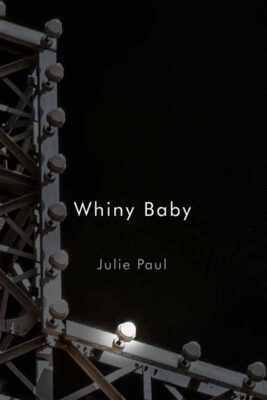Whiny Baby, Julie Paul’s second collection, is a phone call received in the middle of the night. You want to ignore it, but now you’re awake and unnerved, the ringer blaring. “Pick up,” bleats the answering machine. The voice is familiar, tinged with maternal anxiety that is at once both comforting and perverse.

Whiny Baby
Julie Paul
McGill-Queen’s University Press
$19.95
paper
120pp
9780228020745
[…] maybe it was the giant hole
in the logic of importing butter
from New Zealand
or the giant hole in the ozone –
wait, isn’t that healing? Didn’t we do
one thing right?
If the overtly social poems falter in lukewarm critique, it’s the latent politics of the personal that gives the collection its teeth. Paul evokes, at times, Mary Oliver, as witness to the double bind of womanhood, or Elizabeth Bishop’s comically vivid self-awareness. Although wanting in both poets’ prosody, the collection’s strongest moments hinge more on creating emotive resonance than on anything characteristically lyrical. A late ekphrastic poem captures the want to make sense of one’s life through art, or to find a kind of self-reanimation within the art-object itself.
I want to sink deeply
into the natural world, to access,
[…] whatever unites all beings,
to […] make the painting a living thing
but mostly I want to be this woman
In these poems, Paul’s authentic voice – proud mother, anxious citizen, wonder-filled child at fifty – breaks through. For all she claims to fear, Paul displays genuine courage in confronting the question of whether artistic practice is a viable form of self-determination despite all that threatens to undermine it.mRb






0 Comments